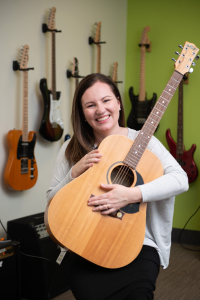Article from 2020/2021 Auxiliaries Annual Report
Music has many benefits for our mind, but also our body. It has been proven to relieve pain, decrease anxiety and stress, reduce blood pressure and pulse rate, and release endorphins to improve mood and relaxation.
It can also help with speech, memory, concentration and movement. At the RCH, the power of music is being harnessed to optimise patient care, recovery and assist rehabilitation of children and young people with brain injuries.
The RCH was the first Australian paediatric hospital to have its own music therapy program, and while other children’s hospitals have since followed suit, the RCH is still the only one to have a specialised music therapist for neurosciences and rehabilitation patients. This is all thanks to philanthropy and the generosity of Knox- Sherbrooke, Parkville, Roxburgh Park and Pankina Auxiliaries and their supporters in 2020/2021.
Music therapy is a part of the Allied Health Department, with music therapists working alongside speech pathologists, physiotherapists and occupational therapists together with medical teams to address the functional figoals identified by the child and their family.
Janeen Bower is one of eight highly trained music therapists at the hospital, working on maternity cover for the neurosciences and rehabilitation music therapist Jo Rimmer. In her role, Janeen is mainly working with children and young people with acquired brain injuries, focusing on early coma arousal and functional rehabilitation.
“Music is globally processed throughout the brain so it’s different to language which is fairly lateralised to the left side of the brain. Music is processed throughout the left and right sides but also in the emotional centres of the brain, which makes it a powerful tool for holistic brain engagement,” said Janeen.
While a child is in a coma, they are in a state of deep unconsciousness as their damaged brains attempt to recover. Despite being in a coma, research indicates that patients are still able to hear words and sounds, making music a powerful tool in the recovery process.
“Early coma arousal work is important as we know that the sooner a child responds to stimulation, the better it is for their recovery. Patients in a coma can respond to music in ways that they can’t respond to other experiences in their environment at the time,” said Janeen.

Janeen Bower in the music therapy room.
“We talk to the family about what music their child would like, then I play and sing to them with my acoustic guitar. It creates a personal connection with them, and I can adapt the music based on their response. This is not an instant process and can take many sessions. I have seen children who smile as they wake up from a coma listening to their favourite song.”
For patients in the later stages of their recovery like Dashiell Gurung, Janeen focuses on reducing mood irritability after injury and practical rehabilitation.
“Our work is framed in the beautiful package of music which is both engaging and enjoyable for patients.”
To help with speech articulation, Janeen works with patients to read lyrics and sing songs. In many cases, children can sing more words than they can speak. With a music room full of instruments, kids can choose to hit the drums, shake a maraca, stroke a guitar or play on the keyboard to help with impulse control and concentration.
Music therapy brings joy to patients as they connect to their sense of self, helping them cope with the stresses of the hospital experience and inadvertently assisting them with their physical rehabilitation requirements.
“To the Auxiliaries, your support ensures we have a dedicated therapist for some of the most critically injured patients. An enormous thank you from our team, the children and their families who benefit so much from music therapy.”